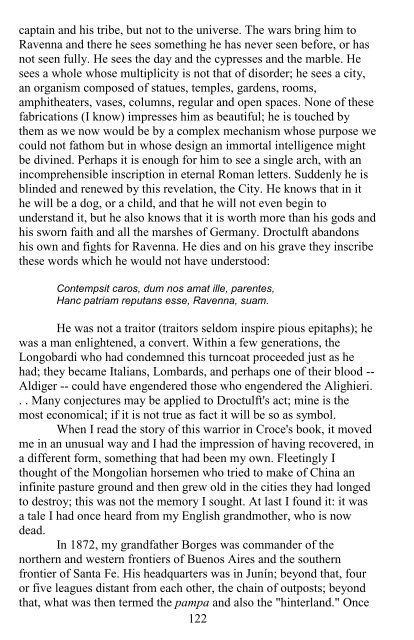Jorge Luis Borges - Labyrinths
Jorge Luis Borges - Labyrinths
Jorge Luis Borges - Labyrinths
You also want an ePaper? Increase the reach of your titles
YUMPU automatically turns print PDFs into web optimized ePapers that Google loves.
captain and his tribe, but not to the universe. The wars bring him to<br />
Ravenna and there he sees something he has never seen before, or has<br />
not seen fully. He sees the day and the cypresses and the marble. He<br />
sees a whole whose multiplicity is not that of disorder; he sees a city,<br />
an organism composed of statues, temples, gardens, rooms,<br />
amphitheaters, vases, columns, regular and open spaces. None of these<br />
fabrications (I know) impresses him as beautiful; he is touched by<br />
them as we now would be by a complex mechanism whose purpose we<br />
could not fathom but in whose design an immortal intelligence might<br />
be divined. Perhaps it is enough for him to see a single arch, with an<br />
incomprehensible inscription in eternal Roman letters. Suddenly he is<br />
blinded and renewed by this revelation, the City. He knows that in it<br />
he will be a dog, or a child, and that he will not even begin to<br />
understand it, but he also knows that it is worth more than his gods and<br />
his sworn faith and all the marshes of Germany. Droctulft abandons<br />
his own and fights for Ravenna. He dies and on his grave they inscribe<br />
these words which he would not have understood:<br />
Contempsit caros, dum nos amat ille, parentes,<br />
Hanc patriam reputans esse, Ravenna, suam.<br />
He was not a traitor (traitors seldom inspire pious epitaphs); he<br />
was a man enlightened, a convert. Within a few generations, the<br />
Longobardi who had condemned this turncoat proceeded just as he<br />
had; they became Italians, Lombards, and perhaps one of their blood --<br />
Aldiger -- could have engendered those who engendered the Alighieri.<br />
. . Many conjectures may be applied to Droctulft's act; mine is the<br />
most economical; if it is not true as fact it will be so as symbol.<br />
When I read the story of this warrior in Croce's book, it moved<br />
me in an unusual way and I had the impression of having recovered, in<br />
a different form, something that had been my own. Fleetingly I<br />
thought of the Mongolian horsemen who tried to make of China an<br />
infinite pasture ground and then grew old in the cities they had longed<br />
to destroy; this was not the memory I sought. At last I found it: it was<br />
a tale I had once heard from my English grandmother, who is now<br />
dead.<br />
In 1872, my grandfather <strong>Borges</strong> was commander of the<br />
northern and western frontiers of Buenos Aires and the southern<br />
frontier of Santa Fe. His headquarters was in Junín; beyond that, four<br />
or five leagues distant from each other, the chain of outposts; beyond<br />
that, what was then termed the pampa and also the "hinterland." Once<br />
122


